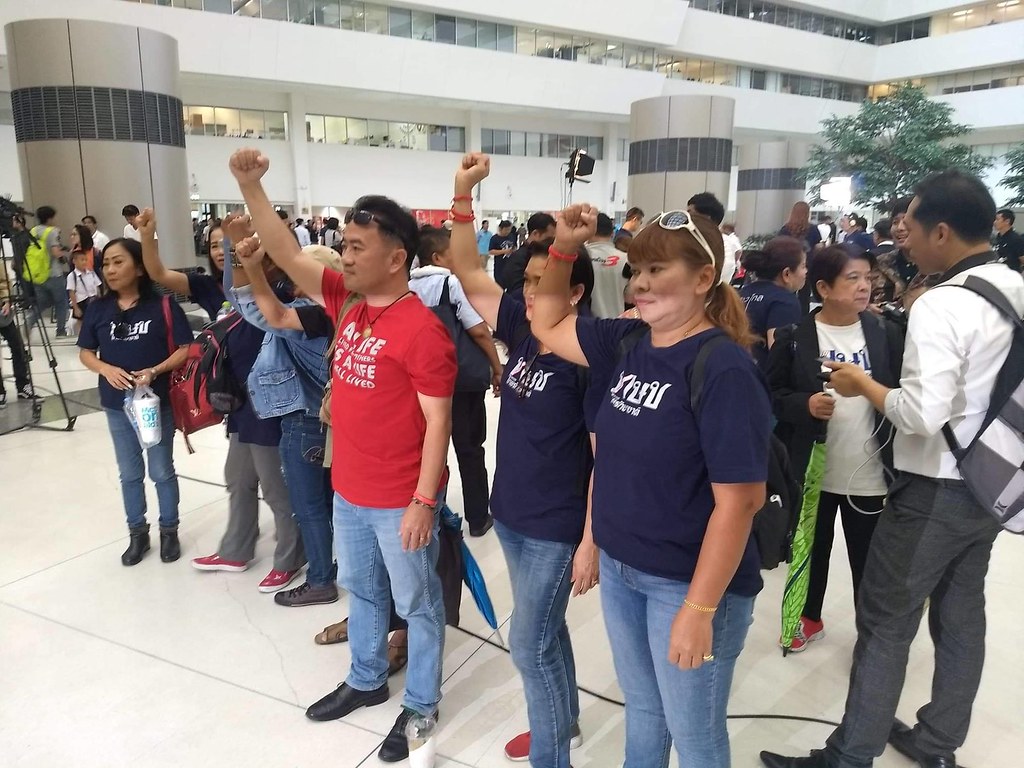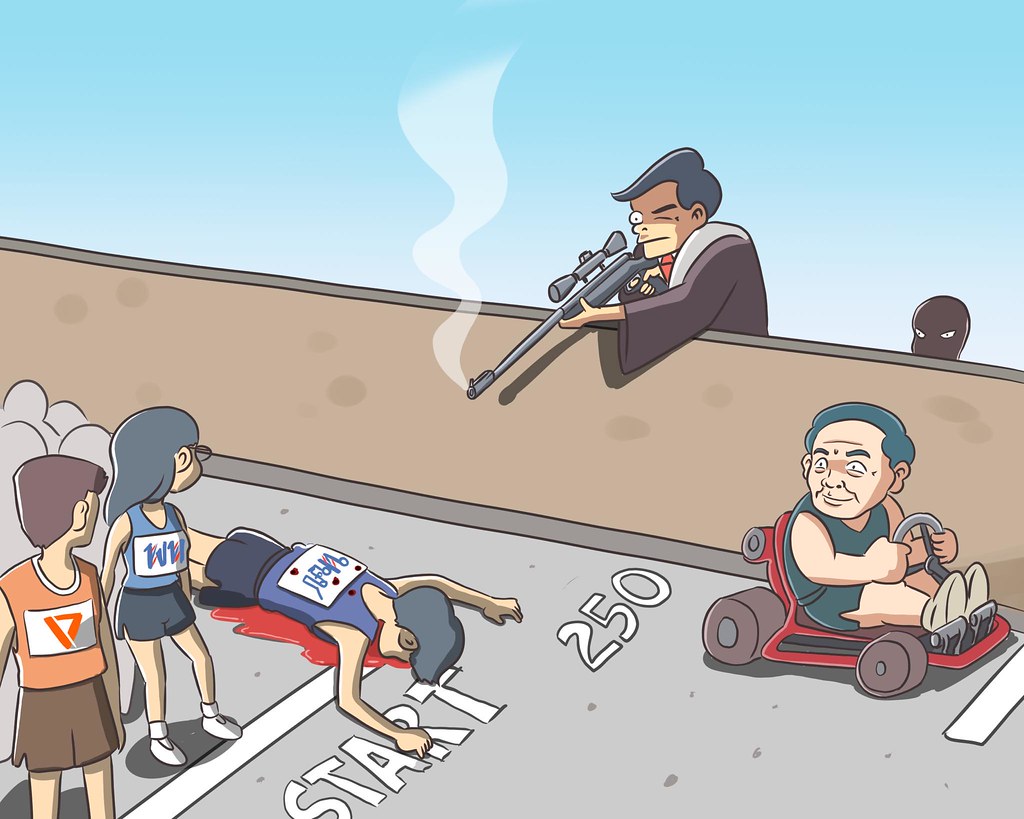On 7 March 2019, the Constitutional Court of Thailand ruled to dissolve the Thai Raksa Chart Party (TRC), claiming that the TRC’s nomination of former princess Ubolratana Mahidol as their candidate for Prime Minister was in opposition to the constitutional monarchy. To many, the verdict was not entirely unexpected. Nevertheless, the court’s ruling is another in a series of political earthquakes which have shaken Thailand in the period leading up to the general election on 24 March 2019, triggering a chain of reaction from the moment the verdict was delivered.

A crowd gathered after the verdict has been delivered
Immediately after the hearing concluded, the crowd which had gathered at the Constitutional Court headquarters at the Chaengwattana Government Complex to hear the verdict began to shout “dissolve any party and we’ll still fight” and “a pen can kill a dictatorship” over and over in response to the court’s ruling. They also said that on 24 March, people should vote for the Pheu Thai, Puea Chart, Thai Liberal, and Future Forward parties – the parties they see as pro-democracy and willing to obstruct the NCPO’s power succession. Meanwhile, Ubolratana, who was in Germany at the time, said on her Instagram account nichax that she heard the news of TRC’s dissolution and found it to be very sad and depressing. To a comment which said “This is sad, but I would like to keep standing by you,” she replied “Thank you. I will do my best.”
“A pen can kill a dictatorship”: the internet speaks out on TRC’s dissolution
Online, the hashtags #ยุบให้ตายก็ไม่เลือกลุง (“Dissolve any party and we still won’t vote for uncle”) and #24มีนากาพรรคฝั่งประชาธิปไตย (“Vote for pro-democracy parties on 24 March”) trended on Twitter after the verdict was delivered. Student activist Tanawat Wongchai tweeted on 8 March asking netizens to tweet with the hashtag to send a message to Gen Prayut and the NCPO that even if all pro-democracy parties are dissolved, they still won’t vote for any party that would keep the NCPO in power.
The reactions on Twitter showed increasing opposition against the NCPO as a result of what the public sees as an attempt to eliminate a political rival, and a decreasing faith that the election would be free and fair.
Meanwhile, satirical Facebook pages such as เรื้อน and ไข่แมวx posted illustrations of the situation. One represents the election as a running race, in which Gen Prayut is in a go-kart, while the TRC candidate has already been shot down by a man in a judge’s robe, while another shows a disappearing pimple on the face of the character representing Gen Prayut. Both of these illustrations reflect the perception that the court decision added to the unfairness of the election.

(Photo credit: เรื้อน)

(Photo credit: ไข่แมวx)
The 2019 general election could be the first election in Thai history in which social media plays a major role. The online movement in response to the TRC dissolution invites people to raise questions about Thailand’s political situation and the fairness of the upcoming general election. Many netizens are saying that they are now paying more attention to politics than before, and many are encouraging each other to go out and vote as this is the only way to bring genuine democracy back to the country. One person tweeted “There won’t be any protest. We’ll fight for democracy at the polls.” Since the majority of Twitter’s demographic is between 18 and 30 years old, most users are first-time voters in this election, and now more than ever, they are paying attention to what is happening in the political sphere.
According to elect.in.th, first-time voters made up 1.96% of all eligible voters in 2012, but because Thailand has not had a general election in 8 years, first-time voters now make up 13.74% of all voters. This group of voters, who are between 18 and 25 years old, have spent their lives experiencing different periods of political unrest, including two military governments, and their vote could now change the outcome of the election.
Meanwhile, journalists are also speaking out on their personal social media platforms. Jonathan Head of the BBC, for example, tweeted on 7 March that “it’s worth remembering that the Constitutional Court is viewed as partisan by many Thais. It has now dissolved 3 pro-Thaksin parties and ousted 3 pro-Thaksin governments - with two more ousted by coups. No other political faction has been dealt with like this”.

Is “vote no” the next move?
In Phrae, a crowd of voters gathered in front of the house of former TRC candidate Worawat Ueaapinyakul on 11 March holding not only signs telling candidates to keep fighting, but also signs calling on voters not to vote for anyone. It has been reported that if more people in Phrae cast a “no” vote than for any one candidate, it is likely that the election will be invalidated for that constituency, and the Election Commission will have to hold another poll.
Worawat, after the TRC party was dissolved, said that he has re-joined the Pheu Thai party, and that he would like to wait to hear from the public before he figures out his next move.
FFP and Pheu Thai under fire following TRC dissolution
Following the court’s decision to dissolve the TRC party, the Future Forward Party (FFP) issued a statement in response to the verdict, which was read by the party’s Secretary-General Piyabutr Saengkanokkul on a Facebook live broadcast. The next day, Col Burin Thongprapai, the NCPO’s legal officer, filed a complaint with the Technology Crime Suppression Division (TCSD) against the FFP website administrator for contempt of court over the video post.
Meanwhile, Anat Chang-in, a lawyer from Loei, filed a complaint with the Loei provincial office of the EC calling for the dissolution of the Pheu Thai party. He claimed that Sudarat Keyurapan, the Pheu Thai candidate for Prime Minister, had violated Article 73 Clause 5 of the organic law on the election of MPs by spreading false information with the claim that if people voted for Pheu Thai, Sukklai Chansawang would be elected as a party-list MP, but Sukklai is not on the list of Pheu Thai candidates.

